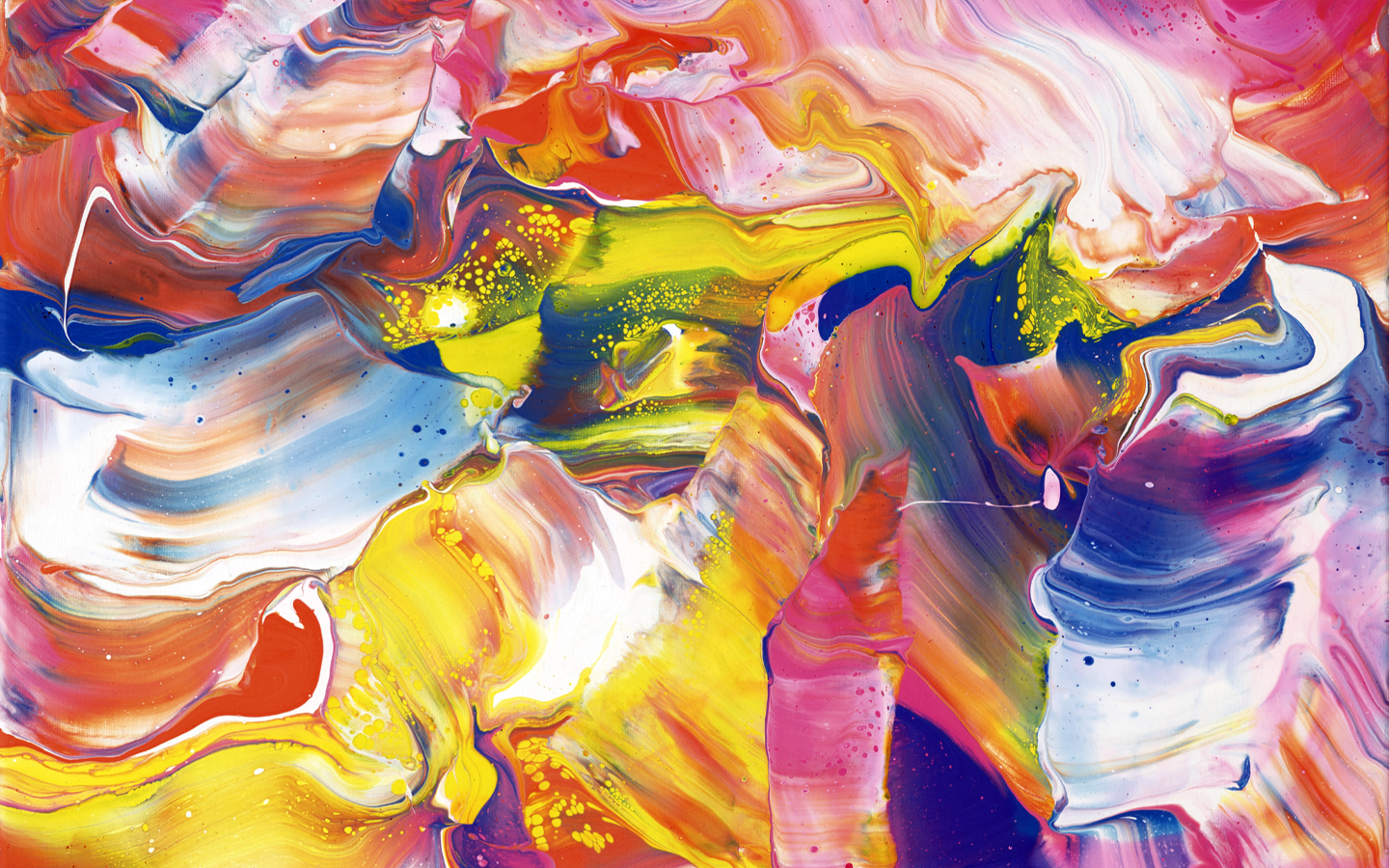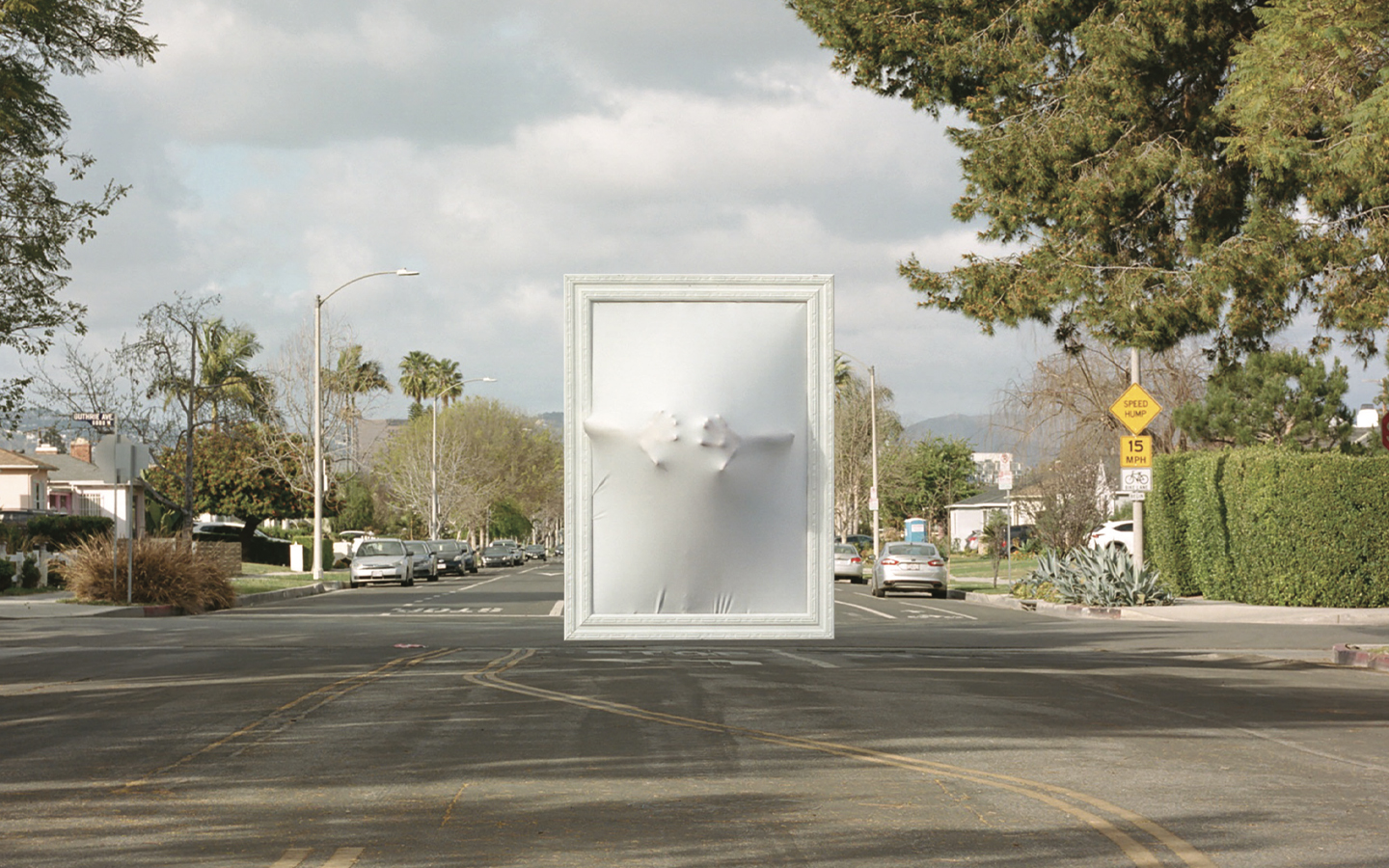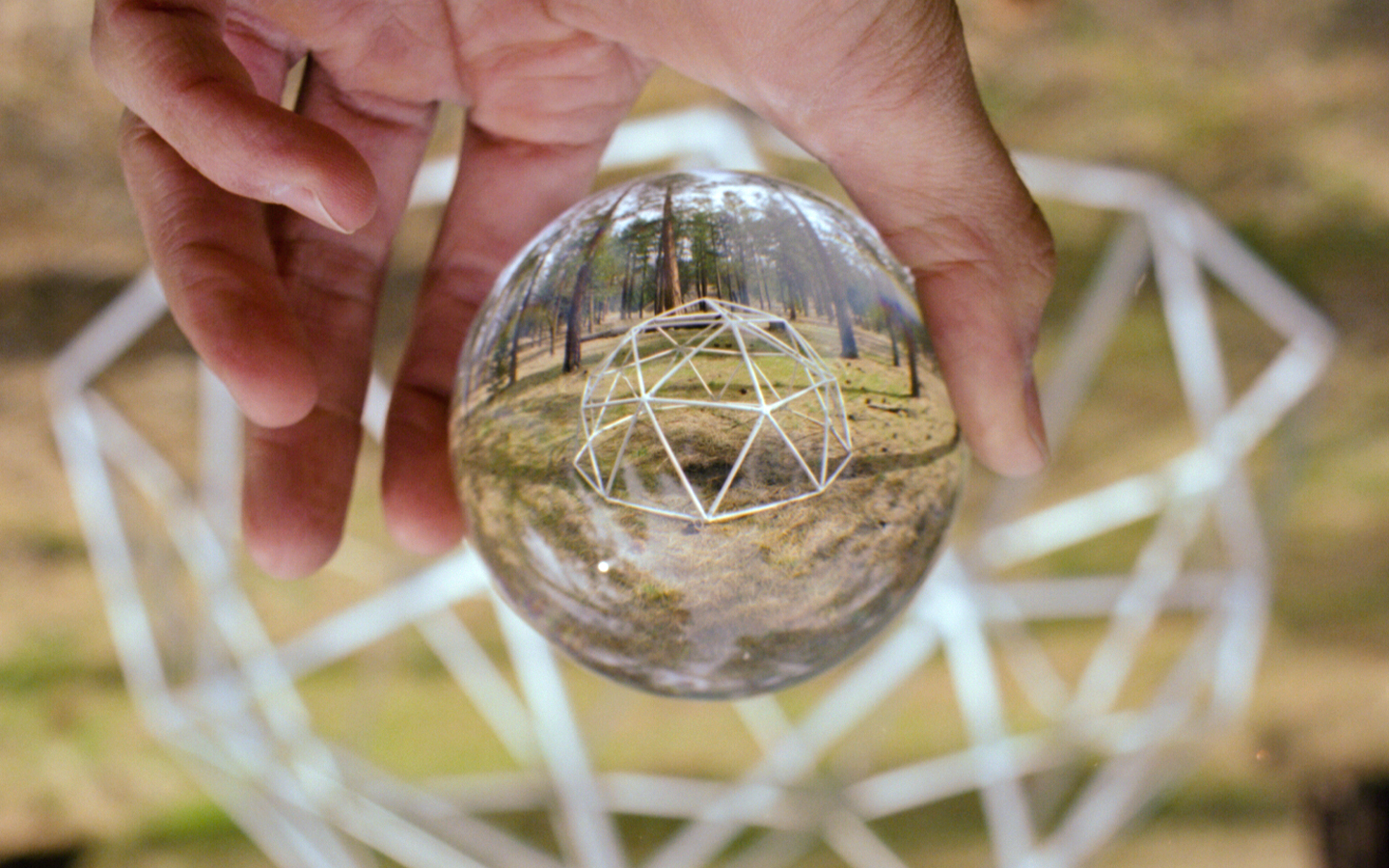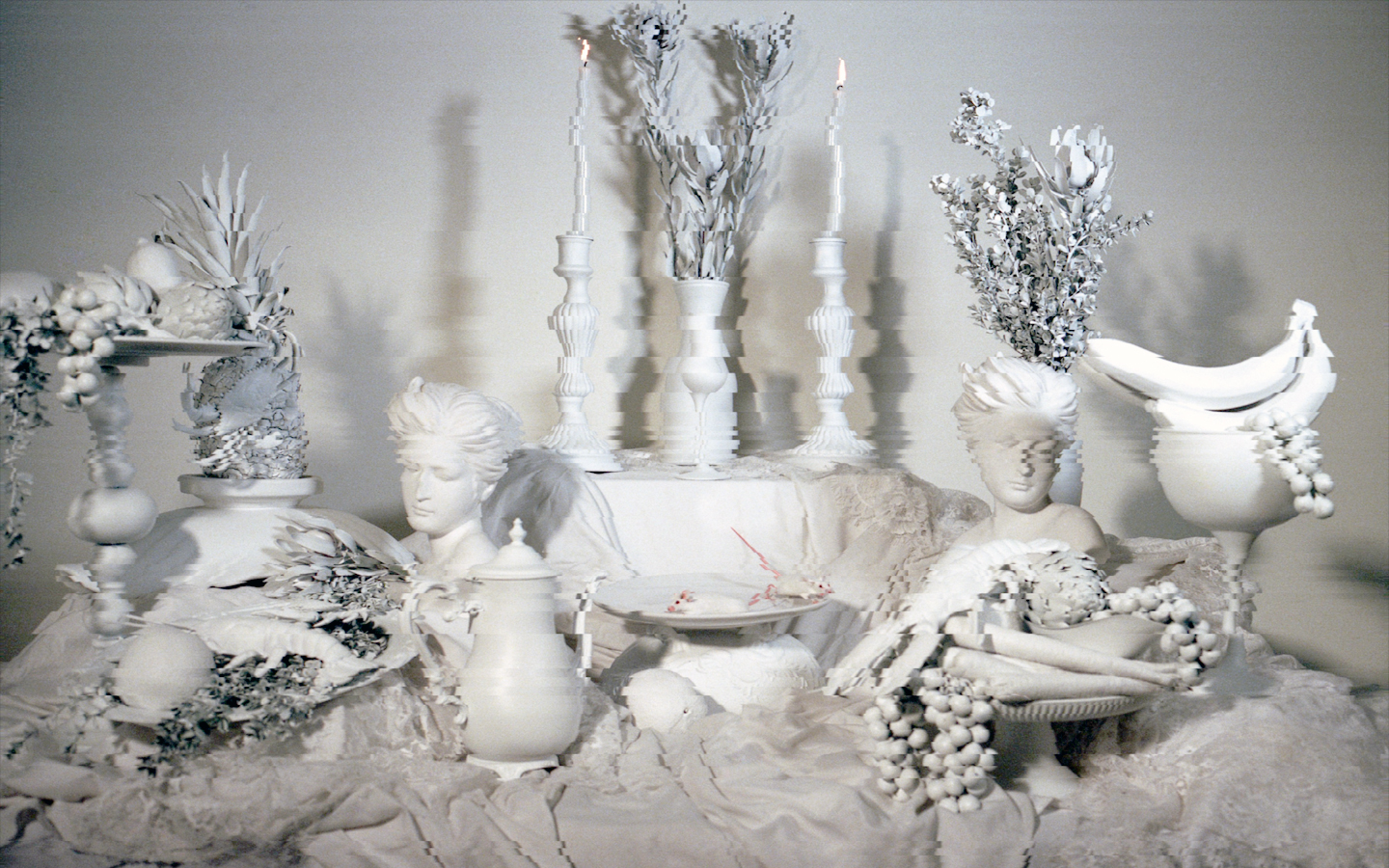
On God
TEXT VANESSA DE HORSEY
VISUAL LAUREN LAKIN
Late this evening I looked at the sky and saw the stars. I felt as if it was the first time I had ever looked at them. I was stunned. The stars made an extraordinary impression on me. ― Andrei Tarkovsky, Journal entry, 28 February 1972
Is god a mirror?
None of us have the answer you want.
I SEE GOD IN TREES
Walking home from the subway, the same streets as always, the breeze like a tender hand against my face—seeing the first rose after the winter months—it feels like god.
I used to live near a park. For a few months one year, I would go every day after work and lie in the same spot under a large tree, slowly letting the stress of the day dissipate until I felt like myself again. My vantage point looked straight up into the sky. All I could feel was the air. All I could see were treetops moving in the wind, occasional birds flying through my line of vision. Day after day, there it was; it all existed with or without me. I felt close to something.
Maybe I mistake Nature for God. Maybe I make no mistake.
THE SOURCE
Throughout history, the advent of gods has been reflective of humanity’s attempt to comprehend the inexplicable: axioms of the universe, human behavior, tragedy, purpose. To make sense of the world, we attribute invisible laws to invisible lawmakers, and then we act as translators. Over time, as truths come to light and as our social values and codes shift, our conception of the lawmakers shifts accordingly. In his 1845 work The Essence of Religion, humanist philosopher Ludwig Feuerbach wrote,
The feeling of dependence in man is the source of religion; but the object of this dependence … is originally nothing but Nature. Nature is the first original object of religion, as is sufficiently proved by the history of all religions and nations.
Before we had god, we had nature. As humans evolved, so did the idea of what—or who—had ultimate power. In the ancient world, anthropomorphic deities with specific demands and personalities took over, providing frameworks for mortals on Earth to follow. But our ideas of god have always derived from the same primary source: looking up into the night sky—the infinite expanse of darkness which contains infinite light. Feuerbach explains,
God is a super-terrestrial, superhuman, supreme being, but even this supreme being is in its origin and basis nothing but the highest being in space, optically considered: the sky with its brilliant phenomena. All religions of some imagination transfer their Gods into the religion of the clouds, into the ether of the sun, moon and stars: all Gods are lost at last in the blue vapor of heaven.
In the twenty-first century, our myriad advances have bolstered humanity’s sense of anthropocentrism to the point that it is encoded in our social fabric. Thus, we live by this inherent (yet learned) notion that “human beings are the central or most significant entities in the world … separate from and superior to nature,” and, therefore, “human life has intrinsic value while other entities (including animals, plants, mineral resources, and so on) are resources that may justifiably be exploited for the benefit of humankind.”
Existing in a heavily developed and industrialized world under late capitalism, nature is seen like almost everything else: as a commodity. The majority of the human population does not interact with the resources we depend on; values are based on human-created currency, removing us further from the natural world. It is a place for vacations, for pictures, for amusement; a respite from the cold desks of our open- plan offices. Nature feels like a separate entity that lives alongside us, or rather, beneath us; but because humans claim to own land, we forget that we don’t own nature. We can cut down trees, we can influence the way crops grow, but we can’t control the weather, we can’t prevent hurricanes or earthquakes. We can’t avoid death.
In so many of our pursuits for truth and understanding, we consider humans the unknown variable. We don’t account for what we don’t see, don’t know, don’t understand. Instead, we construct ersatz explanations. We live in a logical world, we think; there is evidence for how things work. Yet how long ago was it that we discovered laws of gravity, or conservation of energy? As Einstein said, “We see a universe marvelously arranged, obeying certain laws, but we understand the laws only dimly. Our limited minds cannot grasp the mysterious force that sways the constellations.” Despite the knowledge humans accrue, we continue to lump all invisibles and unknowns into one entity: god. And that provides us a sense of relief. Because nature doesn’t listen to our desires. Nature doesn’t heal a broken heart or get you a job; it doesn’t respond to requests.
We say that we serve god, but did we create god to serve us? Our ability as humans to imagine alternate realities has, thus far, been our defining characteristic as a species. Over the course of centuries, we have consistently turned our fictions into facts. We have not been dissuaded by the idea that because something does not currently exist that it could never exist. On the contrary, the faith humans have put in ourselves to actualize our visions, absurd as they may seem, is the fountainhead of our evolution—the driving force responsible for the technological systems we’re familiar with today. This overall unfounded yet unshakable belief in sheer possibilities is what fuels our minds to pursue the unthinkable; it motivates us beyond the criticism, the doubt, whatever obstacles inevitably occur. We construct what we believe we need, both material and conceptual; divine beings are no different. The objects of human worship imagined throughout the ages can thus be understood as representations of their respective society’s ideals and aspirations.
Yet despite our proclivity to create, we resist change. We fear losing the structures we have built, wobbly as they may have become. Perhaps this is why different faiths have such a hard time accepting other views—they have each created a clear conception of god, and any competing or contesting idea completely dismantles the anchor they have cast. The feeling of being in control is shattered. The threat of chaos looms.
As humans, we are disquieted by the unknown. Often, our solution is to generalize and simplify what we don’t understand. We see this all the time in daily life—shortcuts to conclusions that are ultimately nothing more than biases. As Pragmatist philosopher John Dewey explained,
[T]he philosophical fallacy … consists in the supposition that whatever is found true under certain conditions may forthwith be asserted universally or without limits and conditions. Because a thirsty man gets satisfaction in drinking water, bliss consists in being drowned.
The issue is not necessarily the abstraction itself, Dewey says, but the abstraction taken to illogical extremes, which William James (another Pragmatist) referred to as “vicious abstractionism.” The human obsession with assigning a value to everything can easily cloud our experiences; as we attempt to dress everything with significance, we lose sight of the original intent; we lose the truth. This is the paradox of god.
FAITH
There are, indeed, things that cannot be put into words. They make themselves manifest. They are what is mystical. — Ludwig Wittgenstein, Tractatus
But does god exist? Belief in a higher power is not so different as belief in any other invisible phenomena. Do you believe in love? Science can’t prove love’s existence in all of its multiplicity; the most empirical explanations point to love being a biological imperative—and yet who among us would deny that love is real? It is not by chance that science’s greatest minds believe there is more beyond the visible. As Carl Sagan poetically explained,
Science is not only compatible with spirituality; it is a profound source of spirituality. When we recognize our place in an immensity of light-years and in the passage of ages, when we grasp the intricacy, beauty, and subtlety of life, then that soaring feeling, that sense of elation and humility combined, is surely spiritual.
Do we really need a metric to validate our belief in a higher power? Maybe the point is to be open to receive what the world has to offer, to be willing to accept the possibilities beyond our own experience and comprehension. Einstein said:
The most beautiful emotion we can experience is the mystical. It is the power of all true art and science. He to whom this emotion is a stranger, who can no longer wonder and stand rapt in awe, is as good as dead. To know that what is impenetrable to us really exists, manifesting itself as the highest wisdom and the most radiant beauty, which our dull faculties can comprehend only in their most primitive forms—this knowledge, this feeling, is at the center of true religiousness. In this sense, and in this sense only, I belong to the rank of devoutly religious men.
Pragmatists say that we can only understand through experience—we can never find truth through theorizing alone. Similarly, we do not believe in god by thought alone; it is through our subjective interactions with a higher force that results in our belief. And faith is the direct derivative of belief confirmed by experience. Have you had an experience that has left you breathless, unnerved? Have you had encounters that you believe were fated to happen? Does logic even matter when these things happen?
I’ve heard before that if we could prove the existence of god, we would all have god, but nobody would have faith. “The ideal is concerned with things that do not exist in our own world as we know it, but it reminds us of what ought to exist on the spiritual plane,” Tarkovsky wrote. The most profound moments are those that show up unexpectedly, those we cannot predict; the moments that surprise us, that seem to transform the world we are accustomed to into something completely new.
When I was very young I asked my father, ‘Does God exist—yes or no?’ And he answered me brilliantly: ‘ for the unbeliever, no, for the believer, yes!’ —Andrei Tarkovsky
TO EXIST
The search for god, if pursued on one’s own terms, is a search for truth. Consider The Divine Comedy: Dante does not traverse Hell, Purgatory, and Heaven to know god; he is looking for himself. He wants to understand the world he lives in and reconcile what he cannot, in reality, accept— socially, politically, personally, spiritually. He thus searches for faith: for a reason to live. Inferno begins with Dante lost in a shadowed forest, the path forward obscured. Paradiso ends with Dante in Heaven, surrounded by light and god’s love. His quest is a multi-layered allegory, but most importantly, it is an allegory for spiritual development—beginning with crushing loneliness, despair, and confusion, and ending with love, understanding, connection, and purpose.
Seventeenth century philosopher Baruch Spinoza deduced god’s existence and then attested that “Whatever is, is in God, and nothing can be or be conceived without God.” In short, god is not a creator or ruler; rather, the entire universe is made of one substance with infinite attributes, and that substance is god. Therefore, because anything within the universe is part of the greater substance (i.e., god), god comprises everything in existence and is dynamic, ever- changing. Einstein subscribed to this idea, saying, “I believe in Spinoza’s God, who reveals himself in the harmony of all that exists, not in a God who concerns himself with the fate and the doings of mankind.”
This view of existence offers us a new way to experience the world—one where we look for meaning everywhere, where we decide what is significant. Just as importantly, we become autonomous and responsible for our own morals and actions. Philosophies like existentialism and secular humanism maintain that humans don’t need to believe in gods at all in order to live fulfilling lives, nor do we need gods in order to be good (virtuous) or ethical. The latter is perhaps the point worth looking at: our value, goodness, abilities, and choices need not derive from a source other than ourselves. As Sartre said in his 1946 lecture Existentialism Is a Humanism,
[Existentialism] declares … that even if God existed that would make no difference from its point of view. Not that we believe God does exist, but we think that the real problem is not that of His existence; what man needs is to find himself again and to understand that nothing can save him from himself, not even a valid proof of the existence of God.
Belief in a god or universal power is the individual’s prerogative—it is never, however, their excuse. This is a liberating thought: if we don’t have a higher power to answer to, if we ultimately have no control, we can find a different kind of peace. We can appreciate the moments of beauty, serendipity, luck, joy, as the special and fleeting instances that they are. We can take solace in the fact that pain, trauma, and loss aren’t infused with morality or reason, and that they, too, are ephemeral.
INFINITY
In Sculpting in Time, poet-filmmaker Andrei Tarkovsky says that “a person is never satisfied, for his sights are never ultimately set on specific finite ends, but on infinity itself.” How true this is, and how often we forget it. We worship the idea of freedom—infinite agency, total power to control. But this is not freedom; freedom is suffocating without a balancing force.
Humans are not infinite creatures; there is a reason why we desire structure, why we fear open-ended options. Consider a simple question: What do you want for dinner? The most frustrating response in the world is often, “Anything. You choose.” The more options we have, the more difficult it becomes to make choices. As existential psychologist Rollo May explored in his 1975 work The Courage to Create, “Freedom is man’s capacity to take a hand in his own development. It is our capacity to mold ourselves … our capacity to pause, to choose the one response toward which we wish to throw our weight.” Limits are the catalysts of evolution. Our specific limitations are what make us the individuals we are, defining the way we grow and operate in the world, designating our challenges and the solutions we create in response.
What we imagine god to be can help us understand what we ourselves wish to be. Humans cannot be perfect, we cannot know everything, but what we can do is seek: look at the world and envision something better. We crave spiritual fulfillment in order to feel whole; and yet, that ability can be found inside us, Tarkovsky says: “A sense of ‘happiness’ is far less important than being able to confirm your own soul in the fight for that freedom which is, in the true sense, divine.”
But what about our existence? Who are we? Who can guide us? What is all of this for? What is our purpose? God or not, the answer lies precisely in the fact that we ask these questions. We decide.
Of course life has no point. If it had, man would not be free, he’d become a slave to that point and his life would be governed by completely new criteria: the criteria of slavery. —Andrei Tarkovsky, Sculpting in Time
I SEE GOD IN THE CHECKOUT LINE
i search for my ambition like a misplaced object.
I felt sorry for myself today, restless, full of ennui—sick of me. God, release me from this vapid lethargy. I read something a friend posted online, something Vonnegut said about the value of going out to run errands. A well-timed coincidence, I think at first. But then I consider an alternative.
So I drove to a neighborhood I’ve never been to and went to a grocery store. There were mostly old people there, in the store and in the parking lot. Something comforting about them; a windbreaker that reminded me of my grandfather’s. The man behind me in line to pay, probably in his late seventies, was waiting to buy three cartons of raspberries. Nothing more. I pictured him putting the raspberries on each of his fingertips and eating them one by one.
I thought about the raspberry man and the windbreaker as I drove home. I thought of my grandfather. The houses I passed, the landscape, the curve of the road, the temperature and weight of the air flowing through the open windows, the flicker of the sun through lush trees. It felt like being in the Hudson Valley, driving down River Road in Poppy’s ‘76 Chevrolet Caprice convertible—big like a boat, navy exterior and white leather seats, and special in its own right—rendered breathless by the world surrounding me. I felt so lucky back then. I became overwhelmed with emotion, driving through La Cañada Flintridge, nostalgia transforming into something else—something I can only describe now as simultaneously existing in two dimensions. Were things so different?
I felt lucky again. And then melancholy crept in; I began to recognize the streets around me, close to home, the feeling of connectedness with this entire universe—the gift from god—dissipating with the same fragile ephemerality that allowed it to flutter into my car thirty minutes prior. When I walk into my house, things are exactly as I’d left them.
I SEE GOD IN MY MOTHER’S HANDWRITING
dirty window screens, books
bleached blue
the room i loved, always too hot or too cold i hate to think what it is now
all secrecy lost and
i loved the things i hadn’t found
wish it would just stay put for a minute
but that air, clear and strong
not like me
show me the purpose of an interaction
and i’ll show you a river that runs
taste of the season on your mouth
a reminder
you’ll think of it often
i prayed for help to write this.
You may also like
Lucid Dreaming
Dreams give us a nightly opportunity, without payment or aid of a shaman, to connect with the realms
How To Be on Earth
We have an opportunity to reconsider what we deem essential—and determine the sacrifices we must m
Are we living in a simulation?
“The world,” a concept so real we could assume its existence without proving it, is now “hyper




